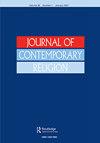The formal rules of organised religion: a framework for empirical research
IF 0.6
3区 哲学
0 RELIGION
引用次数: 0
Abstract
The ideal length of formal rules has been studied as a core preoccupation of firms and states. Shorter rules are a typical firm’s response to performance pressures concerning efficiency; longer rules are a typical polity’s solution to questions of political control and order. Very little is known in this respect about the rules of an institution that has been longer-lived and more influential than most firms and states: organised religion. Are the drafters of church rules more sensitive to performance pressures or to political considerations or to both? This article brings together theories of constitutional politics, church and state, bureaucracy, and economic competition to develop explanations of length variation in the core rules of churches. An empirical exploration proposes ways to test these expectations and produces relevant preliminary evidence. This new direction in the study of institutional religion can update existing understandings of churches as complex institutions that lie somewhere between the ideal-typical firm and the ideal-typical polity.有组织宗教的形式规则:一个实证研究的框架
正式规则的理想长度一直是企业和国家关注的核心问题。较短的规则是企业对效率方面的绩效压力的典型反应;较长的规则是典型的政体对政治控制和秩序问题的解决方案。在这方面,我们对一个比大多数公司和国家都更长寿、更有影响力的机构——有组织的宗教——的规则知之甚少。教会规则的起草者是对业绩压力更敏感,还是对政治考虑更敏感,还是两者兼而有之?本文将宪政理论、教会与国家理论、官僚主义理论和经济竞争理论结合起来,对教会核心规则中的长度变化进行了解释。实证研究提出了检验这些期望的方法,并产生了相关的初步证据。这种机构宗教研究的新方向可以更新现有的对教会的理解,即教会是介于理想典型公司和理想典型政体之间的复杂机构。
本文章由计算机程序翻译,如有差异,请以英文原文为准。
求助全文
约1分钟内获得全文
求助全文
来源期刊

Journal of Contemporary Religion
RELIGION-
CiteScore
1.20
自引率
0.00%
发文量
59
期刊介绍:
Journal of Contemporary Religion is an international peer reviewed journal. Its purpose is to both document and evaluate the anthropological, sociological, psychological, and philosophical aspects of emerging manifestations of religiosity in any part of the world—whether within innovative movements or mainstream institutions. The term ''religion'' in the title of this journal is understood to include contributions on spirituality. Moreover, as the journal title suggests, the focus is on contemporary issues. Therefore, the editors of Journal of Contemporary Religion welcome submissions which deal with: classical topics in the study of religion, such as secularisation and the vitality of religion or traditional sectarian movements; more recent developments in the study of religion, including religion and social problems, religion and the environment, religion and education, the transmission of religion, the materialisation and visualisation of religion in various forms, new forms of religious pluralism, the rise of new forms of religion and spirituality, religion and the Internet, religion and science, religion and globalisation, religion and the economy, etc. theoretical approaches to the study of religion; discussions of methods in relation to empirical research; qualitative and quantitative research and related issues. The Journal includes reviews of books which reflect the above themes.
 求助内容:
求助内容: 应助结果提醒方式:
应助结果提醒方式:


